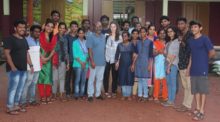By Victoria Sheldon
Funded by the Dean’s Fund for International and Indigenous Initiatives (DFIII) and the Richard Charles Lee (RCL) Pathways grant for Faculty, the Department of Anthropology has been offering an experiential learning program for undergraduate students to undergo two-month internships at the Centre for Research and Education for Social Transformation (CREST) in Kerala, India, since 2015.
The economic liberalization of India and Kerala’s unique history of social development have caused a large number of educated youth to be unemployed. The resulting competitive environment is especially challenging for youth from lower castes, who face discrimination in accessing private sector work opportunities. The government’s caste reservation system may offer government jobs, though these are often stigmatized and offer limited prospects. In response, the Government of Kerala developed CREST in 2008. Situated in the city of Kozhikode (Calicut), the goal of CREST is to enable trainees to compete with job applicants from more privileged backgrounds, and to overcome the prejudice that still impedes their social mobility and full participation in India’s modern economic sectors. CREST works with high school students who seek application to universities, and with trainees who have graduated from state universities. This year, CREST has built up their programming for Scheduled Tribe (ST) students: India’s equivalent of indigenous people.
Two batches of U of T students underwent the internship in 2018: from May to late June, Yasmine Hassen and Tamsyn Riddle, and from July to late August, Mayadevi Murthy and Eilish Sibalis. The student-interns assisted CREST staff by helping trainees to improve their conversational English, upgrade academic and computer skills, and overcome cultural barriers to communication. They mentored CREST trainees individually, and organized leadership activities to help trainees develop their confidence in public speaking in the English language. At the same time, student-interns underwent their own experiential learning through direct discussions with staff and trainees, information interactions, as well as visits to the surrounding areas. The interns gained skills in cross-cultural communication and teamwork, and learned about social exclusion and mobilities in India. With the CREST’s increased programming for ST students, U of T student-interns have also had the opportunity to examine how indigenous communities negotiate contemporary social issues, including social mobility, precarious job security, and capitalist globalization.
Before undertaking their travel, student-interns underwent briefing sessions, providing the practical information and academic background relevant to the project. During their stay at CREST, they immersed themselves in the daily activities of CREST as a way of experientially learning about Kerala social mobilities and its educational system. Each coming from different academic backgrounds, student-interns engaged in continuous reflection and writing during their stay. Under the guidance of the program coordinator, Professor Tania Li, the interns have crafted insightful academic papers that examine expressions of belonging and identity in the globalizing context of Kerala’s changing forms of social mobilities.
Read more about the student-interns’ experiences through their reflection blog posts and biographies of this year’s U of T student-interns.
